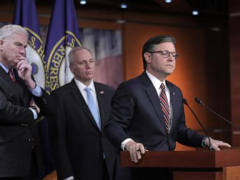WASHINGTON — What, exactly, the Republican Party stands for in terms of economic policy in the second Trump administration is a question reaching an inflection point.
Is it the party that promotes free-market prosperity or a 21st-century populism?
Does it stick with the “No new taxes” pledge that has been GOP political orthodoxy for decades or do Republicans tax the rich, as President Donald Trump suggests?
Roll back the Obama-era’s health care expansion and the President Joe Biden’s green energy investments or protect the federal flow of investment dollars generating jobs in the states?
Slash deficit spending or spike the nation’s now $36 trillion debt load?
Free trade or Trump’s tariffs?
As House Speaker Mike Johnson, R-La., and Republicans race to draft Trump’s “big, beautiful bill” of $4.5 trillion in tax breaks and $1.5 trillion in spending cuts, the final product will set the party on a defining path.
It’s still a work in progress.
“This idea of the American dream where we are the best country in the world — which I believe we are – will be gone and it’ll be our fault, so we have to do something right now to address it,” said Rep. Rich McCormick, R-Ga.
“And everybody wants to say, ‘Oh, yeah, we should do something,’ but nobody’s willing to say what that hard choice is.”
The GOP is shape-shifting its economic policy priorities in real time, transforming from a party that once put a premium on lower taxes and smaller government into something more reflective of the interests of the working-class coalition that depends on the federal safety net and put Trump in the White House.
On the one side, there’s the old-school Republican stalwarts who have guided policy thinking for years. Among them are former House Speaker Newt Gingrich, anti-tax crusader Grover Norquist, who says tax increases would be “stupid, destructive” and the influential Club for Growth, which pours millions into political campaigns.
But a rising neo-populist power center with proximity to Trump carries clout, with Steve Banon and others who reject the traditional trickle-down economic policies and propose a new direction that more benefits Americans.
Divisions run strong within the Republican Party, which holds the majority on Capitol Hill, and is bulldozing past Democratic objections to push its package forward on its own. GOP lawmakers are under mounting pressure to set aside their differences by Johnson’s Memorial Day deadline, especially as Trump’s tariffs stoke unease, and they are eager to signal that the economy is under control on their watch.
“This is a once in a generation bill,” said Rep. August Pfluger, R-Texas, chairman of the Republican Study Committee, a large group of House conservatives.
He said not only would the emerging package extend the tax breaks and cut spending, “it also gives us a mentality just to settle the markets, to give some predictability, to give everybody in our country the ability to go, hey, our economy is going to be strong.”
This weekend, Republican leaders are working to finish the 11 separate sections that will make up that big package before potential public hearings in the coming week.
But the final three — on tax policy, Medicaid and green energy programs, and food stamp assistance — have proved to be the most difficult, posing the bigges





